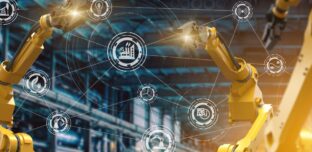The global pandemic has been the catalyst in fostering more positive attitudes towards automated accounting by forcing companies to adopt new ways of working as restrictions imposed to combat the spread of Covid-19 impacted virtually every sector.
A wider acceleration in digital transformation that occurred at the same time also served as a reminder that judicious and timely technology investment can help futureproof accounting firms.
At Moore Belgium, which is part of Moore Global network, we have invested in automated accounting solutions as well as Artificial Intelligence tools, data analytics and Robotic Process Automation (RPA). We allocate between 5% and 10% of revenue to this area, which includes technology investments, change management and non-billable work for converting historic client data to our new systems.
This spend is vital in order to remain competitive but also gives us an advantage in the market because it adds real value for clients. I firmly believe that, in time, this kind of investment will change the face of our profession.
We are among a number of firms in the Moore Global network that have deployed automated accounting solutions for clients with positive results. The pace of uptake was relatively slow pre-pandemic, certainly from our perspective in Belgium, but that is no longer the case.
There is ample evidence that automating tasks such as processing invoices, reconciling bank transaction data and tracking business expenditure makes processing information faster, more efficient and reduces the likelihood of errors.
Some firms sell the merits of automation via claims that it can cut invoice handling costs from $30 to $3 or reduce paperwork processing time from 10 days to 10 minutes. Naturally, there are efficiency and cost savings to be made but that does not tell the whole story.
A more important benefit is that automation provides detailed real-time financial data, giving greater visibility on how a client’s company is performing and helping to predict future trends. Data mining also generates insight that accountants can use to identify red warning flags on payments, for example, or working capital fluctuations and irregular trading patterns.
This, in turn, enables an accountant to brief clients on potential ramifications ahead of time, helping them to make better-informed decisions or remedy situations swiftly if things are going wrong.
Humans and computers
The combination of intelligent software and the input of skilled accountants who can interpret data and advise clients accordingly is a powerful force.
Companies considering a shift to automation will want to know about both cost and complexity. We serve mid-size companies and we do not require clients to make massive IT investment.
When an invoice comes into the system as a PDF it is essentially just a picture. We use software that that can integrate with client systems to extract meaning and capture usable data. More importantly, we build systems that capture data from other sources provided by clients and even their suppliers.
Currently, we process between 10% and 50% of client invoices without human involvement. We aim to get to 80% of all invoices booked automatically in 2021.
Our people add value by interpreting data and engaging with clients. For example, if a company has missed a scheduled tax prepayment our team can identify this as a potential problem, call the company to explain the consequences and suggest remedies. Similarly, we can predict potential future constraints on working capital and speak to management about how to get back on track.
It takes strong communication skills as well as technical knowledge to earn and keep client trust. Regardless of automation, those skills will still be needed in our profession.
Four years ago, Bank of America forecast that 90% of accountants could be replaced by robots by 2025. From a 2020 vantage point that seems very unlikely.
Automation is often depicted as a major threat but the picture is more nuanced. The World Economic Forum predicted in 2018 that artificial intelligence may eradicate 75 million jobs – but has potential to create 133 million new ones.
Technology offers an opportunity to change how we work so that we serve clients better, deliver services and leverage our skills and experience in a way that demonstrably adds value.
It is clear to me that human skills will become more important over time as accountants become ever more like trusted advisors to their clients.
Automated accounting has taken time to gather momentum. Many SMEs were simply comfortable with old ways of working. Invoices would be stored in filing cabinets or desks for months until required for quarterly accounts, then they would be delivered in big mounds of paperwork for processing.
When Covid-19 made travel difficult, businesses had to urgently rethink the methods they used to transfer, upload, process and store vital financial information. Consequently, we saw an almost 100% increase in clients switching to automated accounting in the first few months of the pandemic.
Lessons from the past
Apprehension over finance-related technology is not a new phenomenon – think of early reactions to automated cash machines, internet banking and contactless payments.
Even back in 1885, when bank clerk William Burroughs invented his eponymously-named adding machine, he encountered many sceptics. He invented his ground-breaking automated device out of frustration at having to add long columns of figures using only pencil and paper.
Realising that his creativity was wasted on monotonous tasks, he patented his invention which became the industry standard. It was soon lauded for bringing “mechanical skill almost to the point of human intelligence” – a prescient comment.
What about the ROI?
Discussions on return on investment (ROI) may focus on hardware and software costs as the key factors for calculations but that would be mistaken. Of course, automation entails significant sums to be spent on robust, flexible, scalable and secure systems. However, the big thing for me is not investment in the ‘tools’ – it is the change project associated with it. That involves restructuring how firms operate, creating a skills matrix and matching people’s skills to specific teams and tasks.
We shifted our organisation to focus-driven teams with four core areas: a data engine team, compliance, client relationships and first line advisory. The first line advisory team is able to liaise with the consulting side of the firm on issues clients are facing and avoid any conflicts by bringing in relevant experts to devise solutions and advice on strategy.
The real payback is that our investment helps us leverage the skills and knowledge of our people and serve clients better. You derive long-term value from retaining clients and helping them prosper.
New charging model for a new era
Clients may wonder whether automated accounting will mean reduced fees as it takes a shorter time to compile accounts. This might be the case but it is not the key consideration. However, we should be open to rethinking pricing models: for instance, we have taken a new approach to billing clients by introducing a subscription model for our services.
Billable hours have long been the norm in accounting, partly based on the unpredictability of how long it might take to perform a task. Automation allows you to assess this more accurately while a subscription model makes costs predictable and transparent for clients. At the same time, this model actually opens up opportunities to offer additional, added-value services that are invoiced separately.
I believe that changing how we charge, accompanied by a strong emphasis on value creation, can bring about a dramatic shift in client mindset. If they begin to view their accountant as a value-creator rather than as a cost it will have profound and positive implications for the profession.
Automation is just a tool but technology can free human creativity. We are on the brink of a new era: the technology and the mindset are there. Let us map a way forward to transform our profession from what it was to what it can be.





















